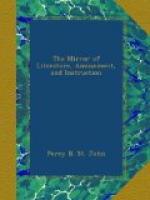The commencement of the third folio is a gratifying contrast to the last horrible incident. It describes the Anniversary of St. Patrick’s Charity Schools, with one of the King’s brothers presiding at the benevolent banquet, and records an after-dinner subscription of 540_l._! What a delightful scene for the philanthropist—what a blessed picture of British beneficence! Yet beneath this is a piracy—a tale of blood, whose very recital “will harrow up thy soul”—the murder of the captain and crew of an American brig, as narrated by one man who was concealed. In the next column are two reports of Parish Elections, which afford more speculation than we are prone to indulge, as the turning-out of old parties and setting-up of new, and many of the petty feuds and jealousies that divide and distract parishes or large families, the little circles of the great whole. At the foot of this column a paragraph records the death of a miserly bachelor schoolmaster, who had worn the same coat twenty years, and on the tester of whose bed were found, wrapped up in old stockings L1,600. in interest notes, commencing thirty-five years since, the compound interest of which would have been L4,000.; and for what purpose was this concealment?—a dread of being required to assist his relatives! Yet contrast this wicked abuse with a few of the incidents we have recorded—the dinner of St. Patrick’s, for instance, and is it possible to conceive a more despicable situation (short of crime) than this poor miser deserves in our chronicle.
The third column opens to us a scene of a very opposite character, the Newmarket Craven Meeting—the most brilliant assemblage ever known there; the town crammed with the children of chance, the innkeepers trebling their charges, and like the Doncaster people, doing “noting widout the guinea.” What an heterogeneous mixture of fine old sport, black legs and consciences, panting steeds and hearts bursting with expectation and despair, and the grand machinery of chance working with mathematical truth, and not unfrequently beneath luxury and the mere show of hospitality.
The moralist will turn away from this rural pandemonium with disgust; but what will he say to the records of wretchedness and crime that fill up nearly the remainder of the folio. A Coroner’s Inquest upon a fellow creature who “died from neglect, and want of common food to support life”—and another upon a poor girl, whose young and tender wits being “turned to folly,”—died by a draught of laudanum—are still more lamentable items in the calendar.
Beneath these inquests is a brief tale of a romantic robbery in an obscure department of France. The priest of a village, aged 80, lived in an isolated cottage with his niece. About midnight, he was disturbed, and on his getting out of bed, was bound by two men, whilst a third stood at the door. The robbers then proceeded to the girl’s chamber, very ungallantly took her gold ear-rings, and by threatening




